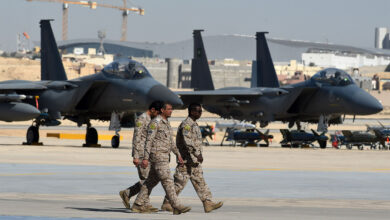Yemen separatists seize two government military camps outside Aden
Yemeni separatists took control of two government military camps in the country’s south on Tuesday, August 20, just days after separatists in the capital Aden agreed to partially withdraw from government buildings captured in fighting earlier this month.
Fighters from the Security Belt Forces aligned with the Southern Transitional Council initially surrounded a Yemeni special forces camp in Zinjibar, the capital of the country’s Abyan governorate, about 60 km (37 miles) east of Aden – and also surrounded a nearby military camp at Al-Kawd, Abyan governor Abu Bakr Hussein told AFP.
Hussein said the separatists then seized the Al-Kawd camp in fierce clashes, forcing out some 350 troops there, and that they remained positioned around the Zinjibar base following the exit of government forces in a deal mediated by local authorities.
At least four military personnel – two separatists and two government troops – were killed and 23 wounded in the fighting, Hussein said, adding that 1,100 troops had been stationed in Zinjibar.
Mohammed al-Markhi, a commander in the Security Belt Forces aligned with the STC, told AFP that his side was in control of both camps on Tuesday morning.
Yemeni Information Minister Moammer al-Eryani said in an earlier tweet that the Zinjibar base had been besieged.
“The Security Belt Forces … are demanding the [government] troops surrender or they will storm the camp,” he said.
Residents in Zinjibar said separatist fighters were deployed in the city’s streets.
The fighting broke out just days after a joint Saudi-Emirati military delegation in Aden said it had “succeeded in calming the situation” between the two sides, who are ostensibly allies within the Saudi-led coalition against Houthi rebels in the country’s north.
On August 10, the Security Belt Forces ousted loyalists of President Abd Rabbo Mansour Hadi from what was the capital of Yemen’s formerly independent south in clashes that left around 40 people dead.
The STC said they would not withdraw fully from Aden until members of the Islamist Islah (reform) movement, which supports Hadi’s government, were removed from positions of power in the south.
Thousands of people took to the streets in Aden last week waving flags of the STC and calling for southern secession.
The STC tentatively agreed to a withdrawal under pressure by a joint Saudi-Emirati military delegation, but retain control of key military sites.
Experts warn that the Hadi government has long ignored southern separatists’ grievances and that if fighting spreads, the anti-Houthi alliance could potentially fracture into a more complex war.
The United Nations has described Yemen’s civil war as the world’s worst humanitarian catastrophe.
The Saudi-led campaign against the Houthis has failed to dislodge the northern rebels. Riyadh’s main partner, the UAE, has been drawing down its troop presence in Yemen in July and has indicated readiness for a political process to end the conflict.
But the UAE insists it will leave some advisers in the country, and claims to have trained some 90,000 fighters. Among them are the STC and Security Belt forces.
With the war’s two power-brokers backing off the conflict, their proxy forces appear to be vying for leverage at post-war peace talks in pursuit of their own interests, Yemen experts Elisabeth Kendall and Hannah Porter told The Defense Post last week.
Yemen’s Deputy Foreign Minister Mohammad al-Hadhrami said the latest flare-up will undermine peace talks.
“What Abyan governorate is witnessing is an unjustified escalation by the STC,” the Yemeni foreign ministry quoted him as saying.
“It is something that is rejected and unacceptable and will undermine mediation efforts by Saudi Arabia.”
“We reject the continued provision of financial and military support by the UAE to outlawed STC forces in Yemen,” he added.
In an interview with pan-Arab daily Asharq al-Awsat, STC spokesman Nizar Haitham said the group was open to dialogue but ruled out any withdrawal from the military posts in Aden.
“There will be no dialogue if we were to hand over all the positions… what will there be left to negotiate,” he said in remarks published on Tuesday.
The U.N.’s Yemen envoy Martin Griffiths said he held a “positive and engaging” meeting with Saudi’s deputy defense minister, Prince Khaled bin Salman, on Monday to discuss the crisis.
“Tireless role under Khaled bin Salman’s leadership to restore order and stability in south Yemen,” he tweeted Tuesday. “We agreed on the need for continuous dialogue.”
Yemen’s southern separatists expose cracks in Saudi-UAE alliance
With reporting from AFP












